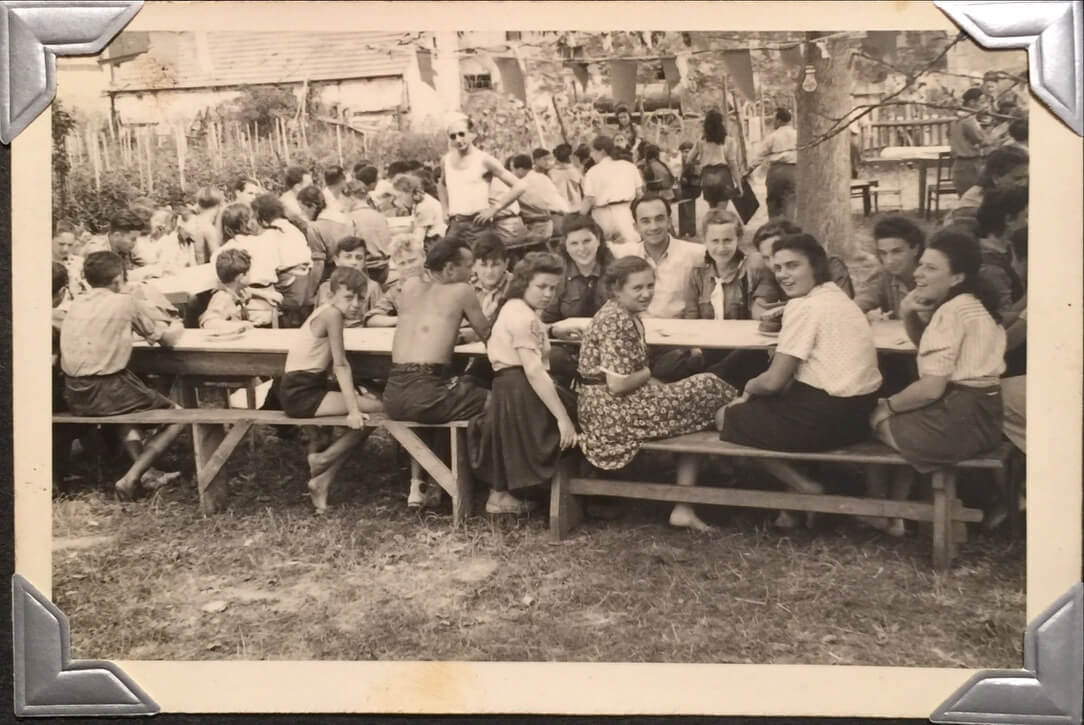Young Jews grapple with how to remember what some Holocaust survivors would rather forget
A new play explores the tension between a mandate to ‘never forget’ and the impossibility of remembering

The play pieces together fragments of archival photos, memories and recordings to explore the question of our responsibility to the past. Courtesy of Mitchell Polonsky
“They should absolutely be allowed to forget,” said Eliya Smith. “Insisting on remembering as a political act is not always the most benevolent thing to do.”
It was the dinner break during a rehearsal for Deadclass, Ohio, a new play going up at the New Ohio Theatre in Manhattan, and we were discussing the ever-present imperative to “never forget” in the wake of the Holocaust.
“But then history disappears,” interjected Mitchell Polonsky.
This is the central quandary of the play, which Smith, who is a former Forward fellow, wrote; Polonsky is co-directing with Chloe Claudel, who is also an actor in the show. We’re often taught that for the sake of history, we must never forget the horrors of the Holocaust. But remembering isn’t so easy.
It’s a personal issue for both Polonsky and Smith. Polonsky’s grandparents were Holocaust survivors, yet, like many survivors, they didn’t talk about their experience. “They understood their mandate as survivors to be to enjoy life,” he said.
Smith’s family, meanwhile, has been in Ohio for generations. For her, the mandate to “never forget,” and an American Judaism built around a history of persecution and diaspora, feels divorced from her experience as “a Jew that’s not wandering and has pretty deep roots in one place.”
The show is set in a Jewish cemetery in the fictional town of Deadclass, Ohio, and constructed around a repeating scene, a séance of sorts. As the show progresses, the boundaries between reality and dream, memory and forgetting, and life and death all begin to blur.
Beyond that, it’s hard to describe; it’s an experimental piece of devised theatre, a form of collective creation. While Smith wrote the original text, the entire cast participates in forming and rewriting the show during the rehearsal process, and the show is constantly shifting. Deadclass, Ohio also draws from Polish artist Tadeusz Kantor’s show, The Dead Class; Kantor was known for avant-garde plays, during which he frequently appeared onstage, refining performances as the show was in progress.
Deadclass, Ohio, too, is constantly refining its take on these questions of trauma, responsibility and memory. I sat in on two rehearsals, less than a week apart; between them, scenes were reordered, two actors switched roles and a character was reconceptualized into someone else entirely. (This could, the team reminded me, all change again by the performance.)
But the show’s ever-changing nature feels fitting for the questions it is attempting to address. Instead of posing answers, it immerses the audience in the shifting senses of responsibility, empathy and ancestry that a younger generation of Jews grapple with.
“We feel obligated to remember but completely unqualified to address what these people went through,” Claudel said.
And memory is, in any case, unreliable. In one of the rehearsals, Polonsky told the cast a famous Talmud story. As he paraphrased the tale, it was about which order to light the Hanukkah candles in; the actual story is about the kosher status of an oven. The basics remain the same, however: The rabbis disagree over a question of Jewish law and one turns to God for an answer. But when God answers, the other rabbis reject it — the Torah was given to the Jewish people, they say, and now it’s in their hands, not God’s.
This, too, is where we stand with the Holocaust, Deadclass, Ohio posits. There are no clear answers; the dead can’t speak. We have to muddle through with what we have, navigating scraps of memory and history and personal experience. And that means making our own choices about what to remember — and what to forget.
“What we can do as people who did not experience it is pass on the story, bear witness to what happened,” said Smith. “But the more we dig into the story, we feel like it is actually so different from what actual survivors felt like their mandate was.”
Deadclass, Ohio will run from June 28-July 1 at the New Ohio Theatre in the West Village. Tickets are available here.























